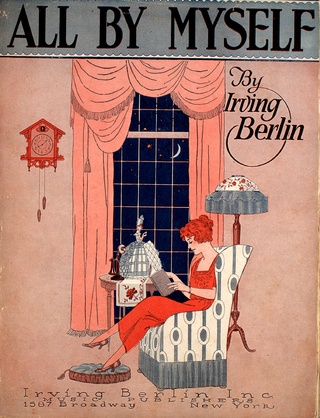Related Research Articles
"Too Darn Hot" is a song written by Cole Porter for his musical Kiss Me, Kate (1948).
"Heat Wave" is a popular song written by Irving Berlin for the 1933 musical As Thousands Cheer, and introduced in the show by Ethel Waters.
"Top Hat, White Tie and Tails" is a popular song written by Irving Berlin for the 1935 film Top Hat, where it was introduced by Fred Astaire.
"You're Laughing at Me" is a popular song written by Irving Berlin for the 1937 film On the Avenue, where it was introduced by Dick Powell. Popular versions in 1937 were by Fats Waller and by Wayne King.
"I Used to Be Color Blind" is a popular song written by Irving Berlin for the 1938 film Carefree, where it was introduced by Fred Astaire. The Astaire recording was very popular in 1938.
"Let Yourself Go" is a popular song written by Irving Berlin for the 1936 film Follow the Fleet, where it was introduced by Ginger Rogers.

"Supper Time" is a popular song written by Irving Berlin for the 1933 musical As Thousands Cheer, where it was introduced by Ethel Waters. The song is about racial violence inspired by a newspaper headline about a lynching.
"I'm Putting All My Eggs in One Basket" is a popular song written by Irving Berlin for the 1936 film Follow the Fleet, where it was introduced by Fred Astaire and Ginger Rogers. Astaire had a huge hit with the song in 1936 and other popular versions that year were by Jan Garber and by Guy Lombardo.
"Isn't This a Lovely Day?" is a popular song written by Irving Berlin for the 1935 film Top Hat, where it was introduced by Fred Astaire in the scene where his and Ginger Rogers' characters are caught in a gazebo during a rainstorm. The lyric is an example of a song which turns a bad situation into a love song, a common style for Irving Berlin, as in "I've Got My Love to Keep Me Warm" and "Let's Have Another Cup of Coffee".
"You Can Have Him" is a popular song written by Irving Berlin for the 1949 musical Miss Liberty, where it was introduced by Allyn McLerie and Mary McCarty.
"Now It Can Be Told" is a popular song written by Irving Berlin for the 1938 film Alexander's Ragtime Band, where it was introduced by Alice Faye and Don Ameche. It was nominated for an Academy Award in 1938 but lost out to "Thanks for the Memory".
"How About Me?" is a popular song written by Irving Berlin in 1928. The song is an expression of sorrow over a love affair that is over. The first recording by Fred Waring's Pennsylvanians was popular in 1928 and the song has subsequently been recorded by many artists.
"No Strings (I'm Fancy Free)" is a popular song written by Irving Berlin for the 1935 film Top Hat, where it was introduced by Fred Astaire. In the film, the character played by Astaire is advised to get married and Astaire responds by saying he prefers to remain as a bachelor and he launches into this song and a major dance routine.(Top Hat#Musical numbers and choreography)
"Slumming on Park Avenue" is a popular song written by Irving Berlin for the 1937 film On the Avenue, where it was introduced by Alice Faye. Popular recordings in 1937 were by Red Norvo and his Orchestra, Fletcher Henderson and by Jimmie Lunceford.
"You Keep Coming Back Like a Song" is a popular song written by Irving Berlin for the 1946 film Blue Skies, where it was introduced by Bing Crosby. The song was nominated for "Best Song" in 1946 but lost out to "On the Atchison, Topeka and the Santa Fe". Dinah Shore's version was biggest in the US reaching the No. 5 spot, while Crosby's version peaked at No. 12. Jo Stafford also had chart success with it and her version achieved the No.11 position.
"Reaching for the Moon" is a popular song written by Irving Berlin for the 1930 musical film of the same name.

"Lazy" is a popular song written by Irving Berlin in 1924. Popular recordings of the song in 1924 were by Al Jolson, Blossom Seeley, Paul Whiteman and the Brox Sisters. The best known version today may be that performed by Marilyn Monroe, Donald O'Connor, and Mitzi Gaynor in the motion picture There's No Business Like Show Business.

"Remember" is a popular song about nostalgia by Irving Berlin, published in 1925. The song is a popular standard, recorded by numerous artists.

"All by Myself" is a popular song written by Irving Berlin, published in 1921.
"I Never Had A Chance" is a popular song written by Irving Berlin, published in 1934. Popular versions that year were by Eddy Duchin and by Glen Gray & The Casa Loma Orchestra.
References
- ↑ Daniel Eagan (26 November 2009). America's Film Legacy: The Authoritative Guide to the Landmark Movies in the National Film Registry . Continuum International Publishing Group. pp. 237–. ISBN 978-0-8264-2977-3 . Retrieved 1 December 2012.
- ↑ "www.allmusic.com". allmusic.com. Retrieved April 30, 2024.
- ↑ "www.discogs.com". discogs.com. Retrieved April 30, 2024.